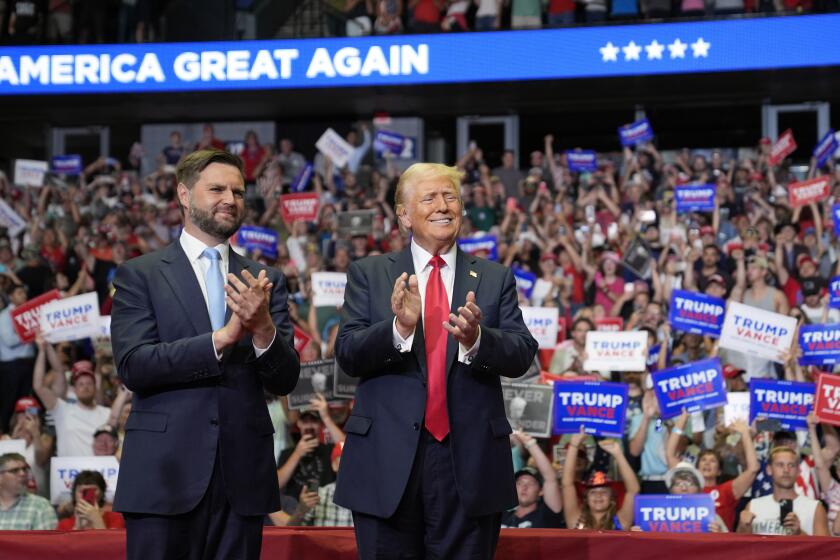Catholic-Jewish Progress Goes On : With Vatican II Renewed, All Can Turn to Repairing the World
The recently concluded synod of bishops has confirmed that the Roman Catholic Church will not halt the progress made during the Second Vatican Council, which changed the way the church regards itself and the world around it.
As a rabbi, I had been particularly concerned that the Vatican might be retreating from one of the historic achievements of Vatican II--”Nostra Aetate,” which repudiated the ancient charge of deicide against the Jews, and thus created the basis for a new and positive relationship between Catholics and Jews.
My fears have been aroused by recent guidelines issued by the Vatican’s Commission for Religious Relations with the Jews, which appeared to introduce a note of religious triumphalism, suggesting that non-Christians are denied the means of salvation. The guidelines also gave scant attention to the Holocaust, and ignored the religious significance to Jews of the rebirth of the state of Israel.
It was gratifying, then, to read that the bishops had voiced confidence in the results of Vatican II and had voted to promote wider knowledge and understanding of its teachings.
The increasing number of Catholics and Jews who have begun the process of interfaith dialogue aimed at deepening our understanding of each other will take heart at the Pope’s declaration. In these inter-faith conversations, Jews and Catholics have been learning much about each other --and not holding back.
On the Jewish side, disappointment has been expressed that the Vatican has failed to establish diplomatic relations with Israel, whose security in peace and dignity is a central issue for Jews everywhere. Certainly the Pope cordially welcomes many Israeli dignitaries. But then the Vatican balances the ledger, as it were, by receiving and embracing Yasser Arafat, and this deeply aggrieves the Jewish community.
Catholics have grievances, too. Many are offended that Jews do not sufficiently support them on the issue of abortion. Generally speaking, Jews hold to the proposition that a woman has the right to terminate an unwanted pregnancy. It is not a right granted casually by Jewish tradition; reverence for life is central to Judaism no less than to Christianity. So Judaism regrets abortion in many circumstances, but almost all Jewish groups support free choice.
Beyond these contemporary issues, there is a more fundamental difference that cannot be resolved, and that provides a theoretical limit to our dialogue: the role of Jesus.
He is, of course, the predominant figure in Christian religious thought: the son of God, the Savior and Messiah through whom a “new” revelation has been brought to humankind replacing the “old” revelation on Sinai.
Because this is so, and because it cannot be otherwise, Christianity assigns Judaism only an antecedent role and not a role of full religious equality. It respects Judaism as part of the religious history of Christianity, but it does not and cannot define the Christ event in terms other than that of Jewish displacement.
Jewish theology does not give Jesus any role. It sees Jesus, if at all, only as a teacher, one of the many such teachers; as a rabbi and follower of the Pharisaic tradition, no more important to Judaism than Mohammed or Buddha is to Christianity.
While acknowledging that some of our differences are irreconcilable, there is no reason why the dialogue should not continue, if only to allay the suspicions that still prevail in both camps. More important, we ought to seek out areas for joint endeavor, working together on the many issues that evoke our common concern and require a united response. Jews can disagree with the Catholic bishops on abortion and with the Vatican on the Middle East but still work with them on racial equality, economic justice, world hunger and nuclear disarmament--issues on which the American Catholic Church has demonstrated courageous, even noble, leadership.
Finally, Catholics and Jews can join in the struggle to counter the corrosive materialism of our time. Surely the spirit of the day is more responsive to religion’s message than it was in the past. Increasing numbers of people are longing for something of enduring worth. Men and women everywhere are beginning to sense that the future of humankind cannot be entrusted to the mindscape of a scientific rationality--that, as the spirit within us withers, so does everything that we build around us.
The synod in Rome expressed this sentiment in eloquent terms, declaring: “Notwithstanding secularism, there are signs of a return to the sacred. There are signs of a new appreciation and thirst for the transcendental and divine.”
It is here, then, that priests and rabbis can bestir their congregants to the task of repairing the world as they recapture their own faith. That is perhaps the best service that Catholics and Jews can render each other--and themselves.
More to Read
Sign up for Essential California
The most important California stories and recommendations in your inbox every morning.
You may occasionally receive promotional content from the Los Angeles Times.










